How Uber won access to world leaders, deceived investigators and exploited violence against its drivers in battle for global dominance
When the ride-hailing giant called, powerful politicians answered, leaked text messages and emails reveal
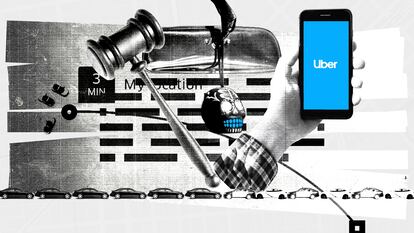
Taxi drivers were creating chaos in Marseille, France’s second-largest city.
They overturned cars, burned tires and blocked access to the airport and train station in protest of Uber, the San Francisco-based ride-hailing company, which they said was breaking laws and threatening their livelihoods.
After repeated clashes, on October 20, 2015, the region’s ranking national police official suspended Uber’s most popular service in key parts of the city.
Needing a friend in government to smooth things over, Uber sought the help of a former investment banker and rising political star: Emmanuel Macron, then the French economy minister.
“I will look into this personally,” Macron texted Uber’s chief European lobbyist before sunrise on October 22. “Let’s stay calm at this point.”

That evening, the local police official revised the order in a way that Uber considered a victory.
“Good cooperation,” the lobbyist, Mark MacGann, texted Macron. “Thank you for your support.”
The exchange was one of more than a dozen undisclosed communications, including at least four meetings between Uber representatives and Macron, as the company faced investigations into its operations in France and sought to keep its toehold there, according to newly leaked internal records.
The records, the Uber Files, were obtained by The Guardian newspaper and shared with ICIJ and 42 other media partners. The cache includes emails, text messages, company presentations and other documents from 2013 to 2017, when Uber was barging into cities in defiance of local laws and regulations, dodging taxes and seeking to grind into submission the taxi industry, most prominently, but also labor activists.
Uber’s scandals and missteps in the United States, from its spying on government officials to its leaks of executive misconduct, have been the subject of books, TV series and newspaper investigations.
The Uber Files reveal the inside story of how the ride-hailing company’s executives muscled into new markets, then managed the fallout, propelling Uber’s rise from scrappy Silicon Valley startup to global giant.
Uber promoted itself as a leader of the digital revolution, but pushed its agenda the old-fashioned way, the records show: spending gobs of cash on a global influence machine deployed to win favors from politicians, regulators and other leaders, who were often eager to lend a hand.
“Right now you are seen as aggressive,” the prime minister of the Netherlands, Mark Rutte, told Uber’s founder, Travis Kalanick, in 2016, according to meeting notes. “Change the way people look at the company” by stressing the positives, Rutte advised. “This will make you seem cuddly.”
That aggressiveness — plunging into markets without government approvals — made Uber’s drivers the target of traditional cabbies’ rage. Taxi drivers saw their business threatened by competitors who didn’t have to play by the same rules. In Europe, Asia and South America, cabbies staged protests, harassed Uber customers, beat Uber drivers and set fire to their cars.

Some Uber executives sought to spin violence to their advantage. They discussed leaking details of a near-fatal stabbing and other brutal attacks to the media hoping to draw negative attention to the taxi industry, the communications show.
Uber executives also sought to deflect inquiries about the company’s aggressive tax avoidance strategies by volunteering to help host countries collect income taxes owed by drivers, documents show.
The records include details of private exchanges and get-togethers: a US ambassador chatting with an Uber investor in a Finnish sauna; a Russian oligarch entertaining company executives with a Cossack band; a company lawyer circulating a “dawn raid manual” that tells employees what to do if law enforcement officers swoop down on Uber offices to seize potential evidence of illegal conduct.
And they shed light on internal discussions among executives grappling with the fallout of Uber’s chaotic global strategy.
MacGann described Uber’s approach to entering new markets as a “shitstorm,” according to the documents.
“We’re just fucking illegal,” Nairi Hourdajian, then head of Uber’s global communications, wrote to a colleague amid government efforts to shut down the ride-hailing service in Thailand and India.
The Uber Files also show that the company’s use of stealth technology to thwart government investigations was far more expansive than previously reported. Company executives activated a so-called kill switch to cut access to company servers and prevent authorities from seizing evidence during raids on Uber offices in at least six countries, according to the leaked documents.
Kalanick personally ordered use of the switch as police were descending on its Amsterdam headquarters, records show. “Please hit the kill switch ASAP,” Kalanick ordered. “Access must be shut down in AMS [Amsterdam].”
David Plouffe, who managed Barack Obama’s successful 2008 presidential campaign, and Pierre-Dimitri Gore-Coty, now in charge of Uber Eats, were told that the company had deployed the kill switch to block investigators, text exchanges show.
To spread its message, Uber and an advisory firm compiled lists of more than 1,850 “stakeholders” — sitting and former public officials, think tanks and citizens groups — it hoped to influence in 29 countries as well as representatives of European Union institutions, the documents show.
Uber also recruited a battalion of former public officials, including many former aides to President Barack Obama. They appealed to public officials to drop probes, change policies on workers’ rights, draft new taxi laws and relax background checks on drivers.
Records shows that Uber executives met with France’s Macron, then-Israeli Prime Minister Benjamin Netanyahu, then-Irish Prime Minister Enda Kenny and then-Estonia President Toomas Hendrik Ilves, among other world leaders.
In 2016, then-U.S. Vice President Joe Biden sought a meeting with Kalanick at the World Economic Forum in Davos, Switzerland.
Kalanick, messages show, grew impatient when Biden ran late. “I’ve had my people let him know that every minute late he is, is one less minute he will have with me,” the then-39-year-old entrepreneur texted a colleague.
Once Biden arrived at the five-star hotel suite, Kalanick made his well-practiced pitch: The ride-hailing company, he said, was transforming cities and the way people work, all for the better.
Biden was so impressed, records show, that he tweaked his keynote speech, delivered later that day, to tout the company’s global impact.
In all, the new records reveal more than 100 meetings between Uber executives and public officials from 2014 to 2016, including 12 with members of the European Commission that haven’t been publicly disclosed.
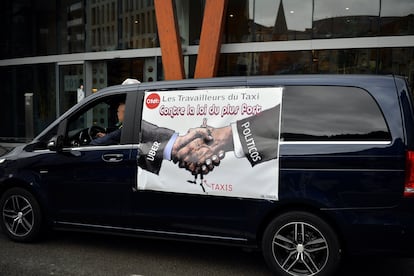
Uber executives also courted oligarchs tied to Russian President Vladimir Putin through former US and UK officials and struck special deals with them. Those oligarchs have since been sanctioned by Western governments in the wake of Russia’s invasion of Ukraine.
In every market, claims that Uber was transforming the workforce were central to the company’s pitch. But some drivers say that they were misled, that Uber lured them to its platform with financial incentives that didn’t last while sharply increasing its commission from each ride. That meant drivers like 44-year-old Abdurzak Hadi of London had to work longer hours to maintain their wages.
Hadi began driving for Uber in 2014 and found it “a joy” at first. But “the joy only lasted a very short time,” he told The Guardian.
Uber soon cut drivers’ incentives and increased its commission, meaning less money for Hadi. The Somalia-born father of three said his 40- to 50-hour workweek for Uber brought in about $23,000 last year.
Jill Hazelbaker, a spokeswoman for Uber, acknowledged “mistakes” and “missteps” that culminated five years ago in “one of the most infamous reckonings in the history of corporate America.”
She said Uber completely changed how it operates in 2017 after facing high-profile lawsuits and government investigations that led to the ouster of Kalanick and other senior executives.
“When we say Uber is a different company today, we mean it literally: 90% of current Uber employees joined after Dara [Khosrowshahi] became CEO” in 2017, Hazelbaker said in a written statement. “We have not and will not make excuses for past behavior that is clearly not in line with our present values.”
Hazelbaker said that Uber has not used a kill switch to thwart regulatory actions since 2017 and that Uber complies with all tax laws. She added: “No one at Uber has ever been happy about violence against a driver.”
The company dismissed any suggestion that it received special treatment from Macron or his cabinet and emphasized that no one who works at Uber today was involved in building relationships with Russian oligarchs.
Kalanick resigned under pressure in 2017 as investors voiced concerns about Uber’s workplace culture, including allegations of sexual harassment, racial discrimination and bullying. He remained a director until the end of 2019.
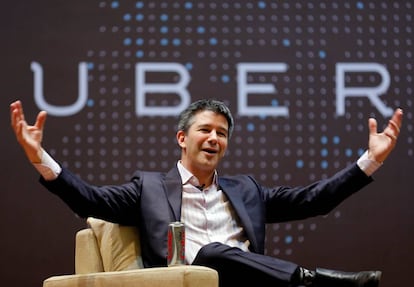
About a week after Kalanick met with Biden, a colleague texted to warn of potential violence at a protest by cabbies in Paris and suggested organizing “effective civil disobedience,” but didn’t elaborate.
“I think it’s worth it,” Kalanick responded. “Violence guarantee[s] success.”
Lawyers for Kalanick said the statement was made by someone else or fabricated. They denied he exploited taxi violence against Uber drivers to obtain favorable regulatory changes.
They said the former chief executive did not authorize or engage in any efforts to deceive or thwart police or other government authorities.
Uber, like other businesses operating outside the US, used technology protocols to protect intellectual property and the privacy of riders and drivers and to ensure due process of law is respected in the event of a raid, the lawyers said.
The protocols do not result in the deletion of any information, the lawyers said, adding that all decisions about their use were vetted and approved by Uber’s legal and regulatory departments.
‘The Pyramid of Shit’
By 2014, Uber was dominating the ride-hailing market in the United States and aiming to conquer the rest of the world.
Armed with buckets of cash from investors like Jeff Bezos and Goldman Sachs, the five-year-old company entered 31 countries in 2014 alone.
It also provoked regulatory crises wherever it went.
Rather than going through the traditional licensing process or working to change laws and regulations governing taxi and similar services, Uber plowed ahead, undercutting rivals by offering steep discounts.
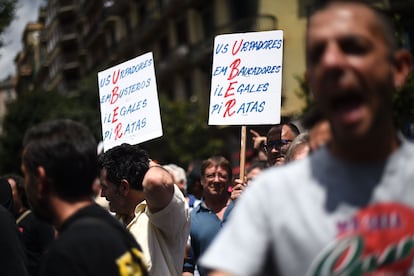
The leaked communications show that some Uber executives embraced the renegade approach as simply the way the company operated.
“Our initial approach was at times too brash,” Uber’s Hazelbaker said.
When Uber sought to enter Poland, for example, the team held “extensive discussions” about how to deal with Polish law ill-equipped to regulate a smartphone-enabled ride-hailing service, Bartek Kwiatkowski, then an Uber consultant, told ICIJ.
The leaked documents show that in 2014 Kwiatkowski asked for guidance about the Polish launch. MacGann, an Uber lobbyist, answered: “Bartek, there are no case studies per se – basically Uber launches, and then there is a regulatory and legal sh*itstorm.”
The guerrilla strategy produced a mounting set of challenges that executives described in a presentation as a “pyramid of shit.” “Driver lawsuits,” “regulatory investigations,” “administrative procedures” and “direct litigation” made up the pyramid.

To surmount obstacles, Uber built a massive influence juggernaut, for lobbying and related activities, with a proposed global budget of $90 million in 2016 alone, according to the leaked documents.
The company borrowed strategies it had honed in the United States.
When Uber needed political muscle to move into a city, it hired former government officials to lobby former colleagues. When accused of breaking rules, the company solicited customers to serve as grassroots lobbyists and sign “save Uber” petitions. And when its agenda seemed in need of a scholarly push, it paid friendly academics to produce favorable research.
Uber adopted the mantra, as two Uber figures put it: It’s better to ask for forgiveness than permission.
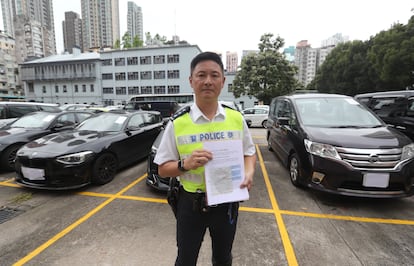
Just as it did in the US, Uber lured drivers in European cities to its platform by offering bonuses and other incentives. It then cut back on subsidies, stripping workers of income they had come to rely on.
The company turned to “strategic investors,” people with deep pockets and political connections, to influence laws abroad. Company executives encouraged them to invest in the ride-hailing app and ensured that they had enough “skin in the game” to help the company overcome regulatory obstacles in their respective countries. The French telecom tycoon Xavier Niel invested $10 million and the German publishing company Axel Springer put up $5 million, as did French fashion magnate Bernard Arnault.
“We don’t need their money per se but could be useful allies to win France,” lobbyist MacGann wrote in an email, referring to Arnault.
Uber also built up an impressive roster of lobbyists.
As its first in-house lobbyist, Uber hired Brian Worth, a former aide to US House Republican leader Kevin McCarthy of California, in 2014. Among the leaked documents is his five-page memo outlining a global expansion strategy, titled: “Leveraging the US government to support Uber’s international business.”
Some Uber lobbyists and advisers were offered equity stakes in the company and success fees for delivering favorable results, according to the documents. Those hired guns offered government officials discounts on Uber rides, “super high level” lunches, advice about jobs, free political campaign work, campaign contributions and other gifts and perks .
Uber also sought to leverage former public officials, including Neelie Kroes, a former Dutch transportation minister who served as vice president of the European Commission, the European Union’s executive arm.
About a year after leaving the commission in October 2014, Kroes asked to be allowed to join a paid Uber advisory board, despite an 18-month so-called cooling off period in the commission’s code of conduct that forbids former commissioners from lobbying ex-colleagues. The commission turned her down and denied an appeal.

During the cooling-off period, Kroes pressed a Dutch minister and other members of the government “to force regulator and police to back off” an investigation of Uber’s Amsterdam office, according to the leaked documents.
And, in May 2016, around the time the cooling-off period was expiring, she told an Uber executive she was working to arrange a meeting between Uber and a European commissioner.
Although the ethics code speaks only to lobbying the commission itself, it also requires commissioners to “behave in a manner that is in keeping with the dignity and the duties of their office, both during and after their term.” It also requires them to “behave with integrity and discretion … even beyond the 18 months after ceasing to hold office.”
After the cooling-off period ended, Kroes joined Uber’s advisory board. Records show Uber offered her $200,000 to chair the board.
“Our relationship with NK is highly confidential,” MacGann reminded his colleagues in a March 2015 email, four months after Kroes resigned from the commission. “Her name should never figure on a document.”
Company executives discussed the risk of Kroes’s becoming “the poster child for the discussions around ‘revolving door/tech’s crony capitalism.’ "
In a written statement to ICIJ, Kroes said: “Consistent with my ethical duties as a former European Commissioner, I did not have any formal nor informal role at Uber” before the end of the cooling-off period. She added that during the period, she took an unpaid role with a Dutch startup support organization that required her to “interact with a wide array of business, government and non-governmental entities.” She said she did so at the request of the Dutch government and with the approval of the European Commission.
Other revolving-door recruits included the flock of former Obama aides, who would seek audiences with US Cabinet secretaries, trade officials, ambassadors and foreign leaders.
Jim Messina, Obama’s former deputy chief of staff, became a political consultant in 2013, taking on Uber as a client. Records show that he sometimes found himself in dual roles: Messina, for instance, asked an Uber lobbyist if he should discuss the company’s regulatory problems in Spain with then-Prime Minister Mariano Rajoy while handling Rajoy’s political campaign, the documents show.
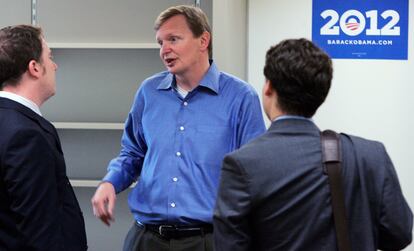
Messina also helped connect Uber executives to US diplomats, including John B. Emerson, a US ambassador to Germany during the Obama administration, and one of Emerson’s predecessors, Robert Kimmitt, then a senior counsel at the WilmerHale law firm. The law firm was looking for work helping Uber overcome legal obstacles in Germany.
The leaked documents throw light on MacGann’s and Messina’s ties to Jane Hartley, the US ambassador to France from 2014 until 2017. Hartley got her prestigious diplomatic post after raising large amounts of campaign money for Obama.
With the company facing regulatory hurdles in France, MacGann requested a meeting with the ambassador. He texted Messina a day before the appointment, asking if he had any messages for Hartley. “Tell her I love her,” Messina responded. “We did give her FRANCE.”
The exchange includes an apparent joking reference to works of art at the lavish ambassador’s residence in Paris:
Adrian Durbin, a spokesman for Messina, said Messina never lobbied for Uber or spoke to any head of state on behalf of Uber. “Mr. Messina’s work for Uber involved helping them understand the political landscape in certain European countries where the company was seeking to grow its business,” Durbin said.
Durbin did not comment on follow-up questions about private conversations that, according to the Uber FIles, Messina told Uber executives he was having with heads of state.
Former Obama aide Plouffe joined Uber as the head of global branding, communications and policy in 2014. He was the architect of Obama’s 2008 presidential campaign, which had pledged, among other reforms, to curb revolving-door lobbying. The documents show him playing a larger role lobbying and leading Uber’s international regulatory fights than previously known.
Plouffe held unpublicized meetings with several US officials, including then-US Labor Secretary Tom Perez and Ambassador Hartley.
A State Department spokesman said Hartley, now US ambassador to the United Kingdom, did not recall any discussions with Plouffe or Messina about Uber. Perez did not respond to repeated requests for comment.
Plouffe also met with officials in countries where Uber was waging regulatory battles, including India. In India, Uber employees were told to expect disruptions from competitors and regulators as the company launched ride-hailing operations. “Embrace the chaos,” the company’s top executive in Asia said in a message.
In the United Arab Emirates, the company turned to Plouffe to “soften Uber’s image,” an Uber public policy specialist, Joanne Kubba, said in an email in the leaked documents.
Kubba told ICIJ in a statement: “David’s meetings didn’t prevent or delay anything — they simply served to show we had responsible and mature leaders in the company who would be professional counterparts with government.”
Plouffe worked for Uber from 2014 until January 2017. Just before he quit, he paid $7.6 million for a 6,000-square-foot house in San Francisco.
The following month, the Chicago Board of Ethics fined Plouffe $90,000 for illegally lobbying then-Chicago Mayor Rahm Emanuel. Emanuel had served as Obama’s chief of staff.
In a statement, Plouffe acknowledged “a very public, global and sometimes fierce debate” over ride-hailing regulations during his time at the company.
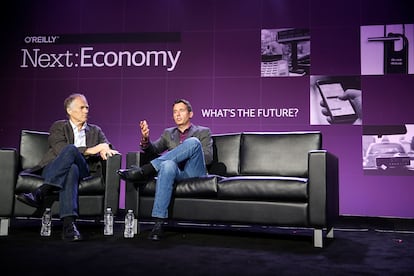
“Sometimes those debates and negotiations were straightforward, sometimes they were more challenging, and sometimes there were people within the company who wanted to go too far,” Plouffe said in a three-paragraph statement. “I did my best to object when I thought lines would be crossed—sometimes with success, sometimes not.”
“Let me tell you,” Plouffe said, “you get in the room with a transportation minister, I don’t care where it is, state capitol, city council, European capital, African country, they don’t care what I or anyone else did before.” The negotiations, he added, “tended to get very specific about a whole set of issues around ride-sharing.
Uber did not comment on specific lobbying efforts but said that as the company “matured,” it strengthened oversight of lobbying and instituted new lobbying guidelines in Europe.
“Uber fulfills its obligations to disclose its activities when required to do so,” Hazelbaker said. “In turn, it is the responsibility of elected officials to disclose meetings when they are required to do so.”
The kill switch
On a Monday afternoon in November 2014, Uber’s Paris office in a leafy business park received unexpected visitors: French inspectors.
“Please kill access now,” Uber attorney Zac de Kievit emailed his colleagues.
De Kievit was referring to the so-called kill switch, which, when activated, disconnected computers from company servers. This would prevent authorities from seizing sensitive company documents .
Over the span of nearly a year, as Uber expanded worldwide, the company used the kill switch to block police from accessing its systems during office raids in France, as well as Romania, Netherlands, Belgium, India and Hungary.
The Uber Files reveal that Uber policy chief Plouffe participated in discussions about at least two of the raids as they took place. In March 2015, he asked for information as police raided the Paris office for at least the second time.
“Police still there. Big force (around 25),” then-lobbyist MacGann said in an email forwarded to Plouffe. “Police trying to get into laptops.”
“Ok,” Plouffe responded. “Real time updates please.”
“Access to IT tools was cut immediately, so the police won’t be able to get much if anything,” MacGann told Plouffe.
In yet another Paris raid, in July 2015, MacGann told France’s Uber manager, Thibaud Simphal, in a text message to “use the ‘Zachary De Kievit’ playbook.”

“Try a few laptops,” he wrote, “appear confused when you cannot get access, say that IT team is in SF and fast asleep, and anyway this is all controlled by uberBV [the company’s Netherlands headquarters], so they should write to Uber BV with their request.”
Simphal responded: “Oh yeah we’ve used that playbook so many times by now the most difficult part is continuing to act surprised!”
The kill switch wasn’t the only technological weapon Uber deployed to dodge police and regulators. The company also identified police or government officials who it thought were ordering Uber cars to gather evidence. It could then show them a fake version of the app with phantom cars that never arrived. It did so in the Netherlands, Belgium, Russia, Bulgaria, Denmark, Spain and other countries.
Staff discussed creating “blackout geofences” around police stations in Denmark. Anyone inside the geofence wouldn’t be able to use the app successfully unless cleared by an Uber employee.
In Brussels, local authorities hired companies to recruit fake customers, or “mystery shoppers,” to take part in stings against Uber. They would order cars so that the authorities could take action against drivers when they arrived. Uber discussed telling staffers to sign up as shoppers under fake names in hopes they’d be alerted when the police were recruiting for any upcoming stings.
In 2014, Gore-Coty, then-Uber’s regional manager for Western Europe, wrote to the staff that the tactics “to fight enforcement” had been compiled in a “very good playbook.”
Gore-Coty, one of the earliest members of the Uber team, did not answer ICIJ’s questions about a playbook of tactics to fight law enforcement.
In an emailed statement, Gore-Coty expressed remorse for some of Uber’s tactics. “I joined Uber nearly 10 years ago, at the start of my career,” he said. “I was young and inexperienced and too often took direction from superiors with questionable ethics.”
Neither Gore-Coty nor Plouffe responded to questions about the kill switch.
Simphal, then manager of Uber France and now global head of sustainability, said all of his interactions with public authorities were conducted in good faith.
In a written statement, MacGann said: “On every occasion where I was personally involved in ‘kill switch’ activities, I was acting on the express orders from my management in San Francisco.”
De Kievit did not respond to requests for comment. Today, Uber said, it routinely cooperates with law enforcement and no longer uses technology to thwart it.
“Uber does not have a ‘kill switch’ designed to thwart regulatory inquiries anywhere in the world and has not since Dara [Khosrowshahi] became CEO in 2017,” spokeswoman Hazelbaker said. “While every company has software in place to remotely protect its corporate devices (for instance, if an employee loses their laptop), such software should never have been used to thwart legitimate regulatory actions.”
After Uber launched its first international efforts, in Paris in 2011, the company ran into rigorous enforcement by French authorities and fierce opposition from established taxi services. Taxi drivers’ anti-Uber demonstrations turned violent, and, in 2014, the National Assembly passed a pro-taxi law that regulated Uber.
French authorities began investigating Uber for possible offenses, including violating tax laws and operating a taxi service without a permit. France’s powerful consumer protection agency, the General Directorate for Competition Policy, Consumer Affairs and Fraud Control, focused on whether UberPOP, the company’s unlicensed, low-cost service, was illegal.
Uber had been gearing up for just this kind of fight.
Uber and an advisory firm compiled lists of “stakeholders,” mostly across Europe, the leaked communications show. In France, the company identified more than 250 allies, adversaries and others, including about 180 politicians and public officials.
After Emmanuel Macron, the fast-rising political centrist, became the economy minister in August 2014, Uber found that it had a high-ranking ally. Macron, then 36, was known as a business-oriented technocrat who once served a stint at the investment bank Rothschild & Co. As economy minister, he oversaw the consumer protection agency.
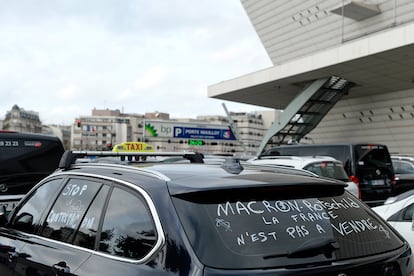
ICIJ partner Le Monde documented more than a dozen communications in the Uber Files — emails, texts, meetings, calls — between Macron or his aides and Uber between September 2014 and February 2016.
Shortly after becoming a minister, Macron had a meeting with Kalanick, the documents show. MacGann described it as “spectacular.” Macron told regulators not to be “too conservative,” essentially committing to interpreting taxi law in ways more favorable to Uber, MacGann said in an email.
Macron “hosted Uber in a remarkably warm, friendly and constructive atmosphere,” MacGann wrote. “Clear desire on his part to work around the … legislation.”
In another exchange, in July 2015, Kalanick asked Macron whether Interior Minister Bernard Cazeneuve could be trusted. Macron replied that he had met with Cazeneuve and then-Prime Minister Manuel Valls the previous day and that Cazeneuve had accepted a “deal.” Macron said he would amend the law, and later that evening, the company suspended UberPOP in France.
Cazeneuve told Le Monde, an ICIJ media partner, that he had never heard of a deal between the French government and Uber. Macron, he said, didn’t tell him anything about that.
Hazelbaker said the company shut down UberPOP in response to high levels of violence against drivers and passengers. “The suspension of UberPOP was in no way followed by more favorable regulations,” she said.
In response to ICIJ’s questions, Macron’s office said the French services sector was in upheaval at the time because of the rise of platforms like Uber, which faced administrative hurdles and regulatory challenges. The office did not respond to questions about Macron’s relationship with Uber.
After building for months, the crisis in Marseille peaked after taxi drivers blocked an Uber executive from speaking at a business fair featuring entrepreneurs. Citing “clashes and excesses disturbing public order,” the local arm of the national police suspended UberX — the most popular Uber service — in central city districts and around the airport and train station.
A “dismayed” MacGann texted Macron the next day, and the minister replied 11 hours later: “I will look into this personally. Let me have all the facts and we will decide by this evening. Let’s stay calm at this point.”
That evening, the head of local national police began to reverse course, promising to clarify the order. Twelve days later, authorities issued a new order saying that the ban applied to unlicensed and unregulated Uber drivers in the whole jurisdiction. Authorities denied receiving any pressure from Macron’s ministry.
Uber chalked up the outcome as a win: “Ban reversed,” the company’s internal weekly update said, “after intense pressure from Uber.”
A high-stakes game
Ten Uber executives descended on the ski-resort town of Davos, Switzerland, to schmooze, party and strike deals with world leaders and oligarchs at the 2016 World Economic Forum.
At the four-day, invitation-only gathering, Uber also impressed then-US Vice President Joe Biden with the company’s commitment to workers.
A theme of Davos 2016 was the digital revolution and the future of work. A 98-page Uber briefing book reveals that then-Uber CEO Kalanick and his subordinates had appointments with four prime ministers, two European Commission vice presidents, French Minister Macron and a smattering of other leaders. They also were scheduled to attend a late-night party hosted by British financier Nat Rothschild and Oleg Deripaska, a key ally of Russian President Vladimir Putin.
“So one vice-president and two prime ministers today,” Rachel Whetstone, Uber’s top communications executive at the time, emailed the boss on Jan. 20, the first day of the Davos forum. She said his schedule also included cocktails and dinner with philanthropist Melinda Gates, a fireside chat with Huffington Post founder Arianna Huffington and a side huddle with Russian billionaire Herman Gref, head of now-sanctioned Sberbank, during a reception hosted by the Russian bank. And lastly, an “entirely optional nightcap” at the Grand Hotel Belvedere, a colonnaded fortress towering over the Davos Promenade.
Behind the scenes, Kalanick spoke with world leaders and senior government officials in countries where Uber was trying to expand.
He met with Xavier Bettel, Luxembourg’s prime minister, and Saudi Arabia’s then-minister of commerce and industry, Tawfig al-Rabiah, documents show. “It was a pleasure,” al-Rabiah wrote later. “We hope to support you to have your official license soon.”
Netanyahu, Israel’s prime minister, publicly voiced support for Uber shortly after his meeting with Kalanick.
“We will break resistance. Let’s work in parallel,” Netanyahu said, according to notes from the meeting.
Uber took special care to keep Kalanick’s meeting with Biden confidential, “even with internal teams.” The chat was arranged through a chain of former Obama staffers.
Accompanied by an ex-Secret Service agent, Kalanick met BIden in Biden’s suite at the InterContinental Hotel, a hotel called the “Golden Egg” for its oval shape. Their discussion centered on Uber’s claims that it was creating lots of jobs and providing jobs that gave people a flexible way to make money. It had the desired effect. Biden changed his prepared remarks at the forum to allude to Uber, according to a message to an Uber staffer from a Biden aide.
“I met with the CEO today of one of those companies,” Biden said in his keynote speech, alluding to Kalanick and Uber while citing Kalanick’s projection of the impact of ride-hailing businesses on the world’s economies. “[He says] he is going to add two million new jobs this year, allowing them freedom to work as many hours as they wish, manage their own lives as they wish.”
In response to ICIJ’s questions last month, a White House spokeswoman said Biden was “committed to combating employee misclassification which deprives workers of critical protections and benefits, including minimum wage, overtime, and family and medical leave.”
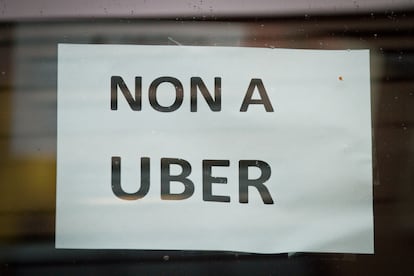
The jobs forecast at Davos was overly rosy. Many of Uber’s drivers — part-time, freelance contractors — were earning less than minimum wage. In many countries where Uber had rolled out rapidly, its drivers were being threatened and attacked by riders, thieves and traditional cabbies.
In South Africa, Uber let drivers begin accepting cash in May 2016 as part of an effort to boost ridership, and gang members ordered rides on the app simply to rob the drivers. In August 2019, two thugs attacked an Uber driver who was smashed in the head with a brick and died, prosecutors said.
Drivers in Cape Town, South Africa, told The Washington Post, an ICIJ media partner, that several drivers were burned alive in their cars.
“I just can’t see myself driving for the platform anymore. I’m too scared,” Faiza Haupt, 61, said in an interview with ICIJ . Haupt began driving for Uber in Cape Town in 2014, hoping to become an independent businesswoman. At first, the work was empowering. Then Uber started taking a higher commission while fares stayed the same.
She quit in 2016, after an angry rider attacked her from the rear seat, pulling her hair and beating her. “I lost control and thought I was going to crash,” Haupt said. “For a woman driving, it is scary.”
From 2014 to 2015, Uber dramatically reduced drivers’ pay in Cape Town by cutting a $4-per-trip bonus to nearly zero, according to leaked documents. Cape Town became one of Uber’s most profitable markets.
In the last five years, Uber said, it has focused on “reorienting Uber’s entire culture — from the top down — around safety,” investing heavily in new technologies and other security features to keep passengers and drivers safe.
“There is much our former CEO said nearly a decade ago that we would certainly not condone today,” Hazelbaker said. “But one thing we do know and feel strongly about is that no one at Uber has ever been happy about violence against a driver.”
Yet leaked documents show that Kalanick and some other Uber executives saw violence and attacks on drivers as strategic opportunities to build support for their cause. They took no responsibility for the violence, even though Uber’s advance into new markets, often in violation of local laws, was triggering it.
Just a week after Kalanick’s meeting with Biden — as French taxi drivers were planning protests that would turn violent against Uber drivers — CEO Kalanick sent his text to colleagues declaring the possible upside of disorder: “Violence guarantee[s] success.”
It wasn’t the only time Uber executives tried to spin violence against its drivers to its advantage. In 2015, taxi drivers in Brussels organized a campaign of harassment against Uber. They threw eggs at Uber cars, smashed side-view mirrors and took keys from Uber drivers. Some even threatened to “lynch” them.
The company’s general manager in Belgium remarked: “Already one driver stepped forward to talk to the press: He had a full sack of flour thrown over him and passengers by taxi. He pressed charges and one taxi driver would have spent a night in jail --> Good story!”
***
After replacing Kalanick in 2017, Dara Khosrowshahi led Uber through a shaky stock market debut, a pandemic-induced ridership slump and an overhaul of business practices. “Dara rewrote the company’s values, revamped the leadership team, made safety a top company priority, implemented best-in-class corporate governance, hired an independent board chair, and installed the rigorous controls and compliance necessary to operate as a public company,” spokeswoman Hazelbaker said. “We’ve moved from an era of confrontation to one of collaboration, demonstrating a willingness to come to the table and find common ground with former opponents, including labor unions and taxi companies.”
Hazelbaker acknowledged the company hasn’t always treated drivers with enough care and respect but has made improvements since 2017. Drivers’ earnings globally are near or at an all time high, she said, and Uber now advocates “globally for more benefits and protections.”
Yet Uber is still dealing with the fallout from its tumultuous international rollout.
Some Uber drivers, especially in developing countries like South Africa, still complain about grueling hours and poor pay. Many entered high-cost leasing deals for their Uber cars. During the pandemic, some couldn’t make ends meet as they struggled to make car payments.
In India, drivers pay Uber 20% to 30% of their fares in commissions, double the amount when Uber launched in the world’s largest democracy, according to gig economy advocacy group Fairwork India.
In the United Kingdom and the Netherlands, courts have ruled that Uber drivers are covered by labor laws.
Elsewhere, rulings have gone against drivers. In the US, the National Labor Relations Board declared that Uber drivers are independent contractors who do not have the right to form unions or bargain collectively.
After racking up more than more than $20 billion in losses over more than 10 years, Uber finally began drawing closer to profitability in 2022.
In May, Uber shareholders voted against a proposal that would have required the company to fully disclose its lobbying activities and spending.
In response to ICIJ questions, Uber didn’t disclose how much it spent in the last year on international lobbying and who got the money.
Contributors: Scilla Alecci, Dean Starkman, Delphine Reuter, Ben Hallman, Jelena Cosic, Fergus Shiel, Mike Hudson, Emilia Diaz-Struck, Miguel Fiandor, Richard H.P. Sia, Hamish Boland-Rudder, Asraa Mustufa, Pierre Romera, Gerard Ryle, Antonio Cucho Gamboa, Joe Hillhouse, Tom Stites, Whitney Awanayah, Margot Williams, Soline Ledésert, Bruno Thomas, Caroline Desprat, Maxime Vanza Lutaonda, Damien Leloup, Adrien Senecat, Elodie Gueguen, Felicity Lawrence, Rob Davies, Jennifer Rankin, Aaron Davis, Robin Amer, Joseph Menn, Douglas Macmillan, Rick Noack, Linda van der Pol, Uri Blau, Dirk Waterval, Karlijn Kuijpers